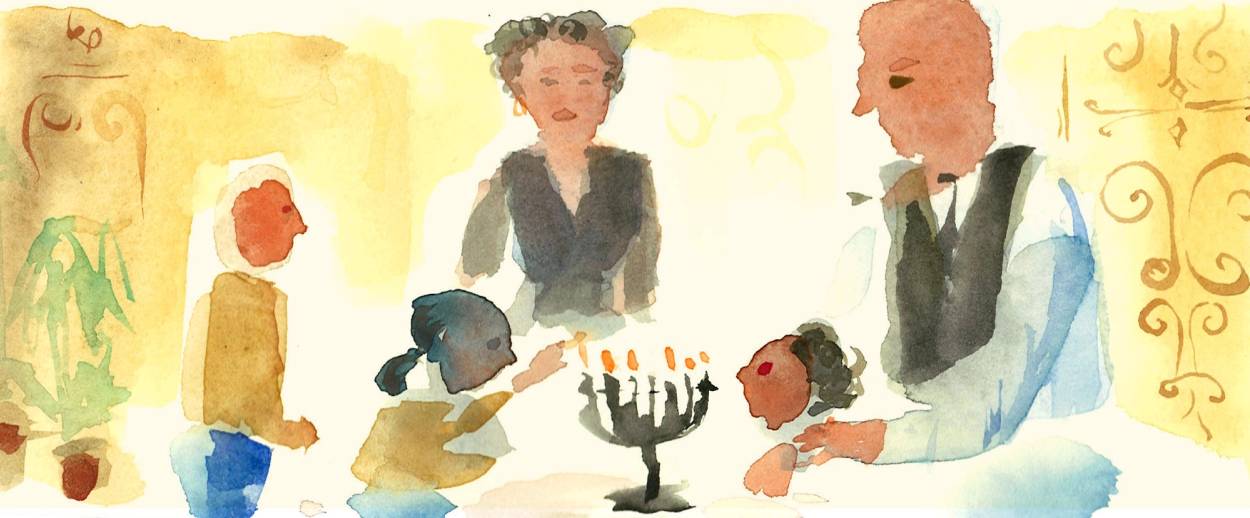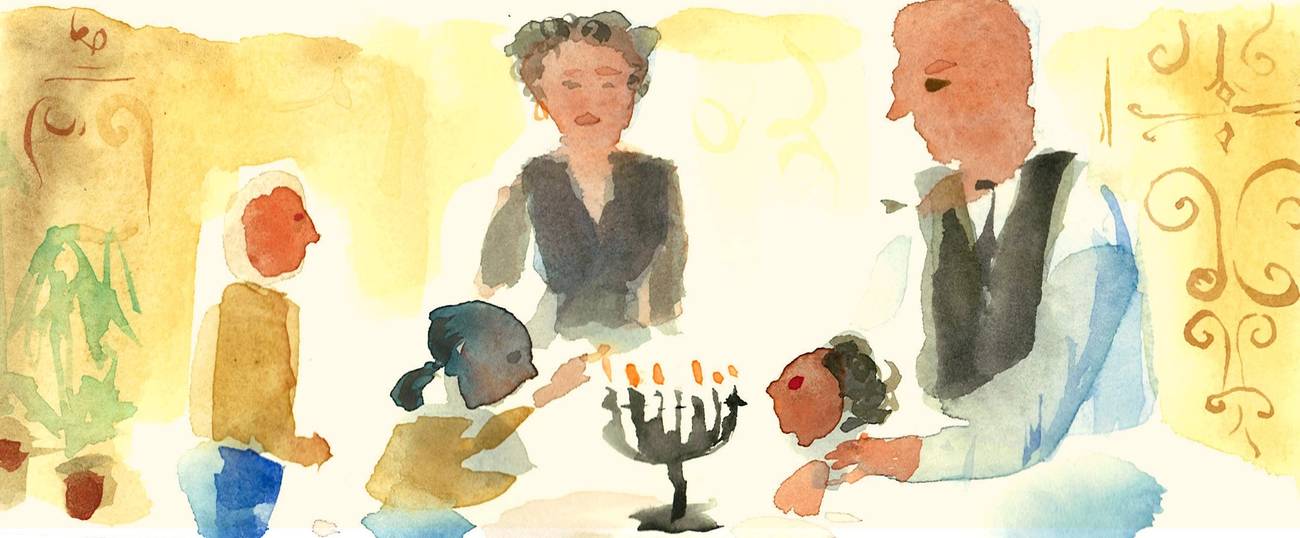Valuing Jewish Grandparents
An undervalued demographic can help promote Jewish identity and values




In 2017, a bubbe and a zayde met for a meal in Baltimore. David Raphael, the zayde in question, was visiting from Atlanta, eagerly awaiting the birth of his first granddaughter. He asked his friend Lee Hendler, a six-times-over grandmother (known to her grandchildren as “Gromzy”), to lunch. “Lee and I have known each other for 20 years,” Raphael told me. He’s a former executive director of Hillel, with four decades of Jewish communal leadership gigs under his belt; she’s a philanthropist who’s served on multiple nonprofit boards. “We started talking about our frustrations with the Jewish community’s ignoring of grandparents’ role in Jewish continuity,” Raphael said. Hendler went on, “Grandparents today have a very different role from grandparents 40 years ago. Our institutions are struggling in a changing environment, and we are, too.”
Modern Jewish grandparents are way more likely than previous generations of bubbes and zaydes, sabas and savtas to have grandkids in multifaith, multicultural households. Their grandkids are more likely to be growing up with LGBTQ parents. They may live in less financially stable circumstances than their boomer grandparents. They may be more geographically far-flung than previous generations.
“Today’s Jewish boomer grandparents are part of the wealthiest and most Jewishly connected demographic in Jewish life,” Hendler noted. “We’re on the front lines of Jewish continuity, but institutions are ignoring us rather than enlisting us as partners.” Hendler and Raphael seek to change that. “For my kids, I was the question-answerer and problem-solver—not Jewish institutions, because they weren’t affiliated with Jewish institutions!” Hendler said. “Anyone doing work with family engagement should be including grandparents, because we play such an important role in Jewish family life. But Jewish institutions say, ‘Oh, we do early childhood,’ and ‘Oh, we do young families,’ and ‘Oh, we do teens.’”
Raphael picked up the thread of the narrative. “I got all excited by what Lee was saying, especially since I was about to become a grandfather,” he said. (He’s now the doting zayde to Bina.) And the Jewish Grandparents Network was born. Its advisory board includes Harlene Appelman, executive director of the Covenant Foundation (“Bubbi” to six); Rabbi Judith Hauptman, professor emerita of Talmud and rabbinic culture at the Jewish Theological Seminary (“Savta” to four); Larry Moneta, VP of student affairs at Duke (“Grandpa” to five); Ilene Vogelstein, independent family education consultant (“Bubba” to three); Ron Wolfson, professor of education at American Jewish University (“Zayde” to one and “Saba” to another); and many more experts in Jewish life, some retired, all eager to help. Several of these Jewishly observant scholars and community leaders had multiple children who’d intermarried. All were privately wrestling with the multiple, complicated roles of being Jewish grandparents. They aren’t just the storytellers and legacy-sharers they’ve always been; now they’re also Jewish educators, identity-formers, and financial supporters.
JGN began with focus groups. Raphael and Hendler learned lots of fun anecdotal facts, such as the tendency of some grandparents of kids whose parents are intermarried to celebrate only “present holidays”: Hanukkah, Christmas, and Easter. (One grandparent referred to their grandchildren as “Jewtherans.”) Another respondent talked of putting a frozen kosher turkey in her backpack after doing the first Seder with grandchildren on the East Coast, then getting on a plane to do a second Seder with grandchildren in California: “By the time we got there, [the turkey] thawed.”
On a broader level, how can Jewish grandparents navigate passing on their legacy to grandchildren while not stepping on their children’s toes? “I am deeply committed to Judaism, while my kids are still figuring out what their path is,” Hendler said. “How do I honor and acknowledge the fact that they are the parents, while also being the Jewish grandparent I want to be?” Raphael shared the dilemma of one board member, a Sabbath-observant Torah scholar, babysitting an interfaith grandchild on Shabbat. “When her granddaughter says, ‘Turn on the TV, Grandma,’ what should she do?” Raphael asked. “How can she be true to herself while respecting her child’s parenting choices?”
Raphael and Hendler hired researcher Karen Radkowsky to provide a national representative sample of approximately 1,000 grandparents ages 55-80 with at least one grandchild under college age. That’s a viable size to extrapolate to the broader community. They also reached out to a comparative group of voluntary respondents, most of whom were affiliated with Jewish life. They partnered with the JCC Association and 16 other national and local organizations, like PJ Library and InterfaithFamily, to recruit survey participants. In one month, almost 7,800 people took the 20-minute survey. “Karen said she’d never seen a response that huge,” Raphael said. “There was a real viral component.”
The goal of the survey was marketing, not demography. JGN wasn’t interested in creating yet another study bemoaning Oh No the Sky Is Falling Look at the Lack of Jewish Engagement and Connection With Israel Among the Youth of Today Veyizmir. Instead, the goal was to figure out, with a 95% level of confidence, how today’s Jewish grandparents relate to their Jewishness. That knowledge can help families connect in a positive, Jewishly infused way. The complete JGN survey won’t be released until June, but Tablet got a look at the preliminary findings.
It found that 47% of grandparents lived within an hour of their grandkids, and 39% lived more than five hours away. Ninety-four percent found grandparenting to be a joyful experience. Sixteen percent struggled to balance grandparenting with their other demands. (Incidentally, this is why the portrayals of Jewish grandparents in children’s picture books are so maddening—kidlit bubbes and zaydes seem to spend all their time being available and white-haired and frail, making matzo ball soup, getting senile, sitting in rocking chairs. In reality, Jewish grandparents are vibrant, busy people with their own lives.) Eleven percent said grandparenting was often stressful, and 19% said their adult children don’t fully appreciate all they do. Nearly half of the grandparents had a child who’d married a non-Jew, but only 20% had grandchildren being raised solely in another faith.
The study found that there were five kinds of American Jewish grandparents, in pretty equally divided categories, as determined by survey participants’ responses to 31 questions about their attitudes and behaviors.
Joyful Transmitters: 20%
Faithful Transmitters: 16%
Engaged Secularists: 23%
Wistful Outsiders: 20%
Non-Transmitters: 21%
Joyful Transmitters were significantly more likely than other groups to say that being a grandparent and watching their adult children parent were joyful experiences. They tended to be synagogue-goers or adult-education learners, and their children tended not to be intermarried. Faithful Transmitters were the most likely to say that transmitting Jewish values and supporting Jewish charities was important to them; they were the highest percentage of synagogue-goers and adult learners. Engaged secularists (a name that Hendler worried aloud about, fretting that it might sound pejorative … meaning that the name may change by the time the study is published) were the most likely to say they felt respected by their child in their role as grandparent, that they enjoyed pampering their grandchildren, and that their grandchild only participated in Jewish activities because of them. This was the least likely group to call themselves religious; slightly over half had intermarried children. Wistful Outsiders were the most likely to say that they wish they were more involved in their grandchildren’s lives and that they didn’t always agree with their children’s parenting, that they felt unappreciated, and that they wished their kids had more appreciation for their Jewish heritage. Non-Transmitters were the least likely to say that it was important to them to transmit Jewish values to grandchildren or that grandchildren marry a Jew. Over a quarter of this group was intermarried. This group was also the most likely to have health issues affecting their ability to grandparent.
“The terms and categories have value so you can act on them,” Hendler said. “You can both understand who these cohorts are and create programming to best reach them.” For instance, the 36% of grandparents who are Transmitters would be most open to programs at JCCs and synagogues. The Engaged Secularists would benefit from learning how to infuse everyday activities and secular celebrations with Jewish values and would be more likely to attend programs not held in Jewish spaces. Wistful Outsiders need tools to help them navigate complex family dynamics and help using technology to connect with far-away grandkids.
In short, not all Jewish grandparents are alike. “You should be able to tailor experiences to appeal to each group,” Raphael noted. “This is Marketing 101, but the Jewish community doesn’t often think about that.” Teasing out unusual findings in the survey, an ongoing process, will help bring together Jewish grandparents with their kids and grandkids in a Jewish way. “I personally think good data asks questions; it doesn’t answer questions,” Raphael said. “There’s a lot of detail yet to be uncovered.”
For instance, a key difference between Joyful and Faithful Transmitters was what they said about their grandchildren’s other grandparent. Overall, 28% of those two groups said the relationship was very good … but half of the Joyful Transmitters said the relationship is very good, while only 20% of the Faithful Transmitters said so. “That’s something I want to explore more,” Raphael noted.
One takeaway for grandparents and parents, for right this second, before the study is released: There’s one trait all grandparents share. All want their kids to lead ethical lives and tell their families’ stories. We can help them do that, can’t we?
***
Like this article? Sign up for our Daily Digest to get Tablet magazine’s new content in your inbox each morning.
Marjorie Ingall is a former columnist for Tablet, the author of Mamaleh Knows Best, and a frequent contributor to the New York Times Book Review.